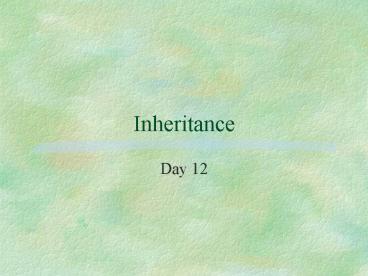Inheritance - PowerPoint PPT Presentation
1 / 18
Title:
Inheritance
Description:
We can define a Mammal class, a Dog class, and a Doberman class, ... enum BREED { YORKIE, CAIRN, DANDIE, SHETLAND, DOBERMAN, LAB }; class Mammal { public: ... – PowerPoint PPT presentation
Number of Views:72
Avg rating:3.0/5.0
Title: Inheritance
1
Inheritance
- Day 12
2
Hierarchies
- Classes in C can form hierarchical
relationships like biological classifications - Kingdom, Phylum, Class, Order, Family, Genus,
Species
3
Hierarchies
- We can define a Mammal class, a Dog class, and a
Doberman class, - where a Doberman is a Dog, and a Dog is a Mammal.
- The Doberman class inherits the properties of the
Dog class, and the Dog class inherits the
properties of the Mammal class.
4
Inheritance and Derivation
- The class Dog inherits the properties of a class
Mammal. - The class Dog is derived from the class Mammal.
- The class Mammal is the base class of the Dog
class. - Derived classes are supersets of their base
class, - because they have all the properties of their
base class (by inheritance), and more.
5
Syntax of Derivation
- When you declare a class, you can indicate what
class it derives from by writing a colon after
the class name, then the class from which it
derives - public indicates the type of derivation
- dont worry about this now
class Dog public Mammal
6
Simple Inheritance
enum BREED YORKIE, CAIRN, DANDIE, SHETLAND,
DOBERMAN, LAB class Mammal public int
GetAge() const return itsAge int
GetWeight() const return itsWeight void
Speak() const cout void Sleep() const cout protected int itsAge int
itsWeight class Dog public Mammal
public BREED GetBreed() const return
itsBreed void SetBreed(BREED breed)
itsBreed breed void WagTail() cout "Tail wagging..." cout private BREED itsBreed class Cat public
Mammal public void Purr() const cout "Purrrrr...\n"
7
Simple Inheritance
void main() Dog fido cout fido.GetAge() endl fido.Speak() fido.WagTail() Cat
tabby cout tabby.GetWeight() endl tabby.Sleep() tabby.Purr()
8
Public, Private, Protected
- To facilitate inheritance, we have added the
protected keyword for declaring member data and
functions. - private members are not available to derived
classes, or any other classes. - public members are available to all classes.
- protected members are available to this class and
to classes derived from this class, but are not
available to all other classes.
9
Constructors and Destructors
- Dog and Cat objects are Mammal objects
- When a Dog object is constructed,
- first the Mammal constructor is called, creating
a Mammal object, - then the Dog constructor is called, creating a
Dog object. - When a Dog is destroyed, first the Dog destructor
is called, then the Mammal destructor.
10
Passing Arguments to Base Constructors
- If the base constructor takes a parameter, the
derived constructor can pass the parameter at
initialization - Data not initialized through parameters of the
base constructor, must be initialized in the body
of the derived constructor
Mammal(int age)itsAge(age),itsWeight(5) Dog(in
t age) Mammal(age), // itsBreed(YORKIE)
itsWeight7 //
11
Overriding Functions
- When a derived class creates a function with the
same return type and signature as a member
function in the base class, but with a new
implementation, it is said to be overriding that
method. - The signature of a function is its name, as well
as the number and type of its parameters. The
signature does not include the return type.
12
Overriding Functions
class Mammal public void Speak() const
coutMammal public void Speak() const
coutspike animal.Speak() // Mammal
sound! spike.Speak() //
Woff! spike.MammalSpeak() // Mammal sound!
13
Calling the Base Method
- If you have overridden the base method, you can
call it by fully qualifying the name of the
method
animal.Speak() // Mammal
sound! spike.Speak() //
Woff! spike.MammalSpeak() // Mammal sound!
14
Hiding the Base Class Method
- If Mammal has a method, Move(), which is
overloaded, and Dog overrides that method, the
Dog method will hide all of the Mammal methods
with that name.
15
Virtual Methods
- Pointers to base classes can be assigned to
derived class objects - You can then use the pointer to invoke any method
on either the base class or the derived class.
Mammal pMammal new Dog
pMammal-Sleep() pMammal-WagTail()
16
Virtual Constructors/Destructors
- If any method in your class is virtual, the
destructor should be as well. - Constructors can not be virtual.
- Virtual copy constructors can be effectively
created by making a virtual member function that
calls the copy constructor.
17
You Cant Get There from Here
- If the Dog object has a method, WagTail(), which
is not in the Mammal, you could not use the
pointer to Mammal to access that method.
18
Slicing
- Virtual function magic works only on pointers and
references. - Passing an object by value will not enable the
virtual functions to be invoked.































